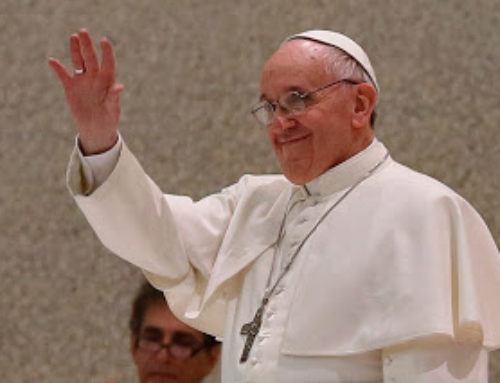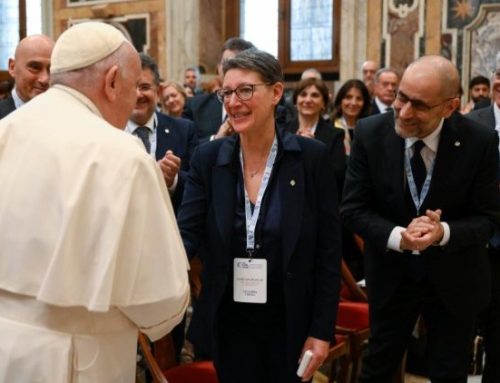Alle ore 12 di oggi, nella Sala Clementina del Palazzo Apostolico Vaticano, il Santo Padre Francesco ha ricevuto in Udienza i partecipanti alla XXI Assemblea Generale della Pontificia Accademia per la Vita, quest’anno sul tema: “L’assistenza agli anziani e le cure palliative” (Aula Nuova del Sinodo, 5-7 marzo 2015).
Pubblichiamo di seguito il discorso che il Papa ha rivolto ai presenti nel corso dell’incontro:
Discorso del Santo Padre
Cari Fratelli e sorelle,
vi saluto cordialmente in occasione della vostra Assemblea generale, chiamata a riflettere sul tema “Assistenza all’anziano e cure palliative”, e ringrazio il Presidente per le sue cortesi parole. Mi piace salutare specialmente il cardinale Sgreccia che è un pioniere…Grazie.
Le cure palliative sono espressione dell’attitudine propriamente umana a prendersi cura gli uni degli altri, specialmente di chi soffre. Esse testimoniano che la persona umana rimane sempre preziosa, anche se segnata dall’anzianità e dalla malattia. La persona infatti, in qualsiasi circostanza, è un bene per sé stessa e per gli altri ed è amata da Dio. Per questo quando la sua vita diventa molto fragile e si avvicina la conclusione dell’esistenza terrena, sentiamo la responsabilità di assisterla e accompagnarla nel modo migliore.
Il comandamento biblico che ci chiede di onorare i genitori, in senso lato ci rammenta l’onore che dobbiamo a tutte le persone anziane. A questo comandamento Dio associa una duplice promessa: «perché si prolunghino i tuoi giorni» (Es 20,12) e – l’altra – «tu sia felice» (Dt 5,16). La fedeltà al quarto comandamento assicura non solo il dono della terra, ma soprattutto la possibilità di goderne. Infatti, la sapienza che ci fa riconoscere il valore della persona anziana e ci porta ad onorarla, è quella stessa sapienza che ci consente di apprezzare i numerosi doni che quotidianamente riceviamo dalla mano provvidente del Padre e di esserne felici. Il precetto ci rivela la fondamentale relazione pedagogica tra i genitori e i figli, tra gli anziani e i giovani, in riferimento alla custodia e alla trasmissione dell’insegnamento religioso e sapienziale alle generazioni future. Onorare questo insegnamento e coloro che lo trasmettono è fonte di vita e di benedizione.
Al contrario, la Bibbia riserva una severa ammonizione per coloro che trascurano o maltrattano i genitori (cfr Es 21,17; Lv 20,9). Lo stesso giudizio vale oggi quando i genitori, divenuti anziani e meno utili, rimangono emarginati fino all’abbandono; e ne abbiamo tanti esempi!
La parola di Dio è sempre viva e vediamo bene come il comandamento risulti di stringente attualità per la società contemporanea, dove la logica dell’utilità prende il sopravvento su quella della solidarietà e della gratuità, persino all’interno delle famiglie. Ascoltiamo, dunque, con cuore docile, la parola di Dio che ci viene dai comandamenti i quali, ricordiamolo sempre, non sono legami che imprigionano, ma sono parole di vita.
“Onorare” oggi potrebbe essere tradotto pure come il dovere di avere estremo rispetto e prendersi cura di chi, per la sua condizione fisica o sociale, potrebbe essere lasciato morire o “fatto morire”. Tutta la medicina ha un ruolo speciale all’interno della società come testimone dell’onore che si deve alla persona anziana e ad ogni essere umano. Evidenza ed efficienza non possono essere gli unici criteri a governare l’agire dei medici, né lo sono le regole dei sistemi sanitari e il profitto economico. Uno Stato non può pensare di guadagnare con la medicina. Al contrario, non vi è dovere più importante per una società di quello di custodire la persona umana.
Il vostro lavoro di questi giorni esplora nuove aree di applicazione delle cure palliative. Fino ad ora esse sono state un prezioso accompagnamento per i malati oncologici, ma oggi sono molte e variegate le malattie, spesso legate all’anzianità, caratterizzate da un deperimento cronico progressivo e che possono avvalersi di questo tipo di assistenza. Gli anziani hanno bisogno in primo luogo delle cure dei familiari – il cui affetto non può essere sostituito neppure dalle strutture più efficienti o dagli operatori sanitari più competenti e caritatevoli. Quando non autosufficienti o con malattia avanzata o terminale, gli anziani possono godere di un’assistenza veramente umana e ricevere risposte adeguate alle loro esigenze grazie alle cure palliative offerte ad integrazione e sostegno delle cure prestate dai familiari. Le cure palliative hanno l’obiettivo di alleviare le sofferenze nella fase finale della malattia e di assicurare al tempo stesso al paziente un adeguato accompagnamento umano (cfr Lett. enc.Evangelium vitae, 65). Si tratta di un sostegno importante soprattutto per gli anziani, i quali, a motivo dell’età, ricevono sempre meno attenzione dalla medicina curativa e rimangono spesso abbandonati. L’abbandono è la “malattia” più grave dell’anziano, e anche l’ingiustizia più grande che può subire: coloro che ci hanno aiutato a crescere non devono essere abbandonati quando hanno bisogno del nostro aiuto, del nostro amore e della nostra tenerezza.
Apprezzo pertanto il vostro impegno scientifico e culturale per assicurare che le cure palliative possano giungere a tutti coloro che ne hanno bisogno. Incoraggio i professionisti e gli studenti a specializzarsi in questo tipo di assistenza che non possiede meno valore per il fatto che “non salva la vita”. Le cure palliative realizzano qualcosa di altrettanto importante: valorizzano la persona. Esorto tutti coloro che, a diverso titolo, sono impegnati nel campo delle cure palliative, a praticare questo impegno conservando integro lo spirito di servizio e ricordando che ogni conoscenza medica è davvero scienza, nel suo significato più nobile, solo se si pone come ausilio in vista del bene dell’uomo, un bene che non si raggiunge mai “contro” la sua vita e la sua dignità.
E’ questa capacità di servizio alla vita e alla dignità della persona malata, anche quando anziana, che misura il vero progresso della medicina e della società tutta. Ripeto l’appello di san Giovanni Paolo II: «Rispetta, difendi, ama e servi la vita, ogni vita umana! Solo su questa strada troverai giustizia, sviluppo, libertà vera, pace e felicità!» (ibid., 5).
Vi auguro di continuare lo studio e la ricerca, perché l’opera di promozione e di difesa della vita sia sempre più efficace e feconda. Vi assista la Vergine Madre, Madre di vita e vi accompagni la mia Benedizione. Per favore, non dimenticate di pregare per me. Grazie.
[00362-01.02] [Testo originale: Italiano]
…………………………….
(Vatican Radio) Pope Francis on Thursday addressed the Plenary Assembly of the Pontifical Academy for Life, which has for its theme, “Assisting the elderly and palliative care.”
Below, please find the full text of the Holy Father’s address to the Pontifical Academy for Life:
Dear Brother Bishops and Priests,
Ladies and Gentlemen,
I cordially welcome you on the occasion of your general Assembly, called to reflect on the theme “Assisting the elderly and palliative care,” and I thank the President for his kind words.
Palliative care is an expression of the properly human attitude of taking care of one another, especially of those who suffer. It bears witness that the human person is always precious, even if marked by age and sickness. The human person, in fact, in whatever circumstance, is a good in and of himself and for others, and is loved by God. For this reason, when life becomes very fragile and the end of earthly existence approaches, we feel the responsibility to assist and accompany the person in the best way.
The biblical commandment that requires us to honour our parents, understood broadly, reminds us of the honour we must show to all elderly people. God associates a double promise with this commandment: “that you may have a long life” (Ex 20:12) and “that you might prosper” (Dt 5:16). Faithfulness to the fourth commandment assures us not only of the gifts of the earth, but especially of the possibility of enjoying them. In fact, the wisdom that makes us recognize the value of the elderly person and that brings us to honour them, is the same wisdom that allows us to appreciate the numerous gifts that we receive every day from the providential hand of the Father, and to be happy. The precept reveals to us fundamental pedagogical relationship between parents and children, between the elderly and the young, with regard to the preservation and transmission of the teachings of religion and wisdom to future generations. To honour this teaching and those who pass it on is the source of life and blessing.
On the contrary, the Bible reserves a severe warning for those who neglect or mistreat their parents (cf. Ex 21:17; Lv 20:9). The same judgement applies today when parents, having become older and less useful, are marginalized to the point of abandonment.
The Word of God is always living, and we see well how the commandment results, proves topical for contemporary society, where the logic of utility takes precedence over that of solidarity and gratitude, even within families. Let us hear, then, with docile hearts, the word of God that comes to us from the commandments – which, let us always remember, are not bonds that imprison us, but words of life.
“To honour” today could be translated as the duty to have extreme respect and to take care of those who, because of their physical or social condition, could be left to die, or “made to die.” All medicine has a special role within society as witnesses of the honour that is due to elderly persons, and to every human being. Neither evidence and efficiency, nor the rules of health care systems and economic profit, can be the only criteria governing the actions of doctors. A State cannot think of making a profit with medicine. On the contrary, there is no more important duty for a society than safeguarding the human person.
Your work in these days explores new areas for the application of palliative care. At first, they were a precious accompaniment for cancer patients, but now there are many different illnesses, often related to old age and characterized by a chronic and progressive deterioration, that can make use of this kind of assistance. The elderly, first of all, need the care of family members – whose affection cannot be replaced by more efficient structures or more competent and charitable healthcare workers. When this is not sufficient, or in the case of advanced or terminal illness, the elderly can be benefitted by truly human assistance, and receive adequate responses to their needs thanks to palliative care offered in such a way that it supplements and supports the care provided by family members. Palliative care has to objective of alleviating suffering in the last stages of illness and at the same time of assuring the patient of adequate human accompaniment (cf. Evang. Vitae, 65). It deals with the important support for the elderly, who, for reasons of age, often receive less attention from curative medicine, and are often abandoned. Abandonment is the most serious “illness” of the elderly, and also the greatest injustice they can suffer: those who helped us to grow must not be abandoned when they need our help.
I therefore welcome your scientific and culture efforts to ensure that palliative care can reach all those who need it. I encourage professionals and students to specialize in this type of assistance, which has no less value on account of the fact that it “does not save lives.” Palliative care recognizes something equally important: recognizing the value of the person. I urge all those who, under whatever title, are involved in the field of palliative care, to practice this duty conserving integrally the spirit of service and recalling that all medical knowledge is truly science, in its most noble sense, only if it finds its place as a help in view of the good of man, a good that is never achieved by going “against” his life and dignity.
It is this capacity for service to the life and dignity of the sick, even when they are old, that is the measure of the true progress of medicine, and of all society. I repeat the appeal of Saint John Paul II: “Respect, protect, love and serve life, every human life! Only in this direction will you find justice, development, true freedom, peace and happiness!” (ibid., 5).
It is my hope that you will continue your studies and your research, that the work of the promotion and defence of life might be ever more efficacious and fruitful. May the Virgin Mother assist you and may my Benediction accompany you. Please, do not forget to pray for me. Thank you!
[B0162-XX.02]










